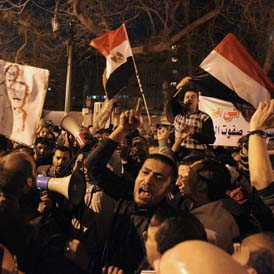Egypt: after the revolution, allegations of military abuse
Two months on from the revolution, Channel 4 News hears powerful allegations of torture, arbitrary detention and sham trials by the Egyptian armed forces once hailed as heroes.
On January 31, six days into Egypt’s popular uprising, the Egyptian armed forces made a series of critical undertakings.
A stiff-looking army spokesman stood in front of the camera and said the army “would not to fire on protesters”. He described the protesters demands as “legitimate” and said “freedom of expression through peaceful means is guaranteed to everybody.”
It is difficult to underestimate the importance of this pronouncement. Hundreds of thousands took to the streets knowing they were safe, if not from President Mubarak‘s interior police, but from the tanks and guns of a powerful and well-trained fighting force.
When the head of the military, Field Marshall General Mohamed Hussein Tantawi assumed power as head of a military council on February 11, he promised to oversee the transition to a democratic government.
Elections were promised for “sometime in September”. Most Egyptians assumed that the army would respect their right to protest decisions made by the government – and the government is now the military.
If the Field Marshall and his fellow soldiers took over with the blessings of the Egyptian people, something has gone wrong in recent weeks.
They stripped off his clothes, he was tortured by electricity. It all happened in the Museum. Mansoura Eladly, mother of 16-year-old victim.
At the beginning of April, thousands of demonstrators again filled Cairo’s Tahrir Square for a day of protest dubbed “Save the Revolution”. Many Egyptians are impatient with the pace of reform and angry with a new law which seeks to ban public protests and strikes.
The Army’s reputation has also been seriously undermined by allegations of torture, abuse and arbitrary arrest.

Allegations of abuse
Citizen journalists and filmmakers have worked with Channel 4 News to collate and obtain information regarding alleged abuses by the Egyptian military, often at great personal risk.
On March 6 large crowds of protesters gathered outside the interior police building in Cairo amid rumours of state security officers destroying files documenting abuse committed by the previous regime.
Footage obtained by Channel 4 News and filmed by local journalists shows panic as soldiers open fire in an apparent bid to disperse the crowd.
As thousands scatter through the streets, protesters can be heard calling out: “The army are firing and electrocuting us. Look. They’re coming with sticks and are beating us”.
Human rights groups say dozens were beaten and detained by the military that night.
Among them was 27-year-old Ahmad Ibrahim. His family have only seen him once in the last month – at his military trial.
“My son told me he was beaten by the arresting officer,” his mother Mona Hussein Hassan said.
They started to beat me. I tried to fend them off, so they tied up my hands. Khaled Yaries
“His jacket was stained with blood. The officer tore off my son’s vest and twisted his arm. My son had a broken arm and he told the officer. The officer said he didn’t care”.
Ahmad was sentenced to two years for possessing a weapon – an accusation his family describe as absurd. He is now in prison, but his family have not yet been able to locate him.
“It’s been two months now and I don’t know where he is. I don’t know how he lives or what he wears or where he sleeps,” Ahmed’s father Hassan said.

Three days after the protest outside the interior ministry, a disturbance broke out on the edge of Tahrir Square on March 9. Events which followed caused even more concern amongst human rights groups.
Soldiers and plain clothes officers charged into the centre of the square where pro-democracy campaigners had been camped since the beginning of the revolution. Footage shows security forces using batons and sticks to force protestors out of their tents before tearing them down.
Some protesters claim they were taken to the nearby museum which was allegedly turned into a torture chamber.
One of them is 21-year-old Khaled Yaries who says he was badly beaten inside the Egyptian Museum. Footage taken as he recovered in hospital shows his torso covered in bruises and red slash marks where, he says, he was beaten by soldiers (pictured above).
“They told me to strip off my clothes and lie on my stomach,” Khaled said. “They started to beat me and I tried to fend them off with my hands. So they tied up my hands.”
Minor ‘electrocuted’
Allegations have also emerged of the Egyptian security forces allegedly torturing and detaining children and minors.
A family told Channel 4 News their 16-year-old son (pictured below) had been detained and tortured in the Egyptian Museum on March 9, before being sent to prison for three years for “possession of explosives”.
“They stripped off his clothes, he was tortured by electricity. It all happened in the Museum,” the boy’s mother Mansoura Eladly told Channel 4 News.
“They took them from Tahrir Square to the Museum and beat them there. They didn’t leave any part of his body unharmed.”
His father says the allegations that his son possessed explosives are untrue. His son had gone shopping on March 9 and wasn’t participating in the protests.
“The new regime is worse than Mubarak,” he said. “This regime is using the same methods as Mubarak’s regime.”

Human rights groups have told Channel 4 News they believe a significant number of young people – including children – have been detained by the Egyptian army.
Heba Morayef from Human Rights Watch said at least four children have been tried and sentenced in military courts while at least another 21 are being detained in camps.
In all Human Rights Watch says thousands have been detained by the military. Parents who have visited their children say cells built for 50 are accommodating 500 who have to sleep on their sides for lack of space.
Two months ago the armed forces were hailed as heroes when they refused to fire on protesters, but the allegations of torture and abuse have damaged the army’s credibility.
‘Age of impunity is over’
Unhappiness with military rule is growing in Egypt as thousands yet again take to the streets demanding change.
Denied access to Egyptian state media protesters have turned to the internet to get their message across posting videos and lurid accounts of their experiences online.
With the allegations emerging to a global audience the army has been forced to respond.
In an interview the chief of military police, Major-General Hamdi Badin, said testimonies and video alleging torture by the military were “totally false” and could have been “fabricated in a variety of ways”.
However an Egyptian government spokesman told Channel 4 News that all serious complaints would be investigated.
“The army will be definitely be investigated and if [allegations are] proven correct they will be subjected to the proper course of law,” Dr Mohamed Elbadri said.
“There is no way that the Supreme Military Council in Egypt will tolerate any kind of impunity even if it involves members of the armed forces because the age of impunity is over.”
The transition to democracy has been promised but the future remains uncertain in Egypt.
For those nursing bruised bodies or looking for children in military prisons the uprising has brought little reward. Few think members of the army will even face justice.
Since allegations of abuse involving children came to light, one of the citizen journalists who worked with Channel 4 News has said a small number of the 25 children in detention have been released.
The exact number is unknown and many more are still believed to be held in military camps.
The parents of the 16-year-old boy alleged to have been electrocuted in the Egyptian Museum say they hope their son will be released on Sunday.




